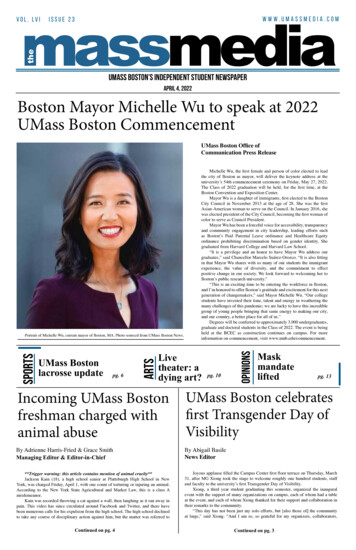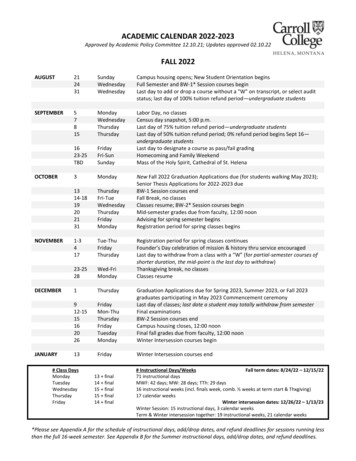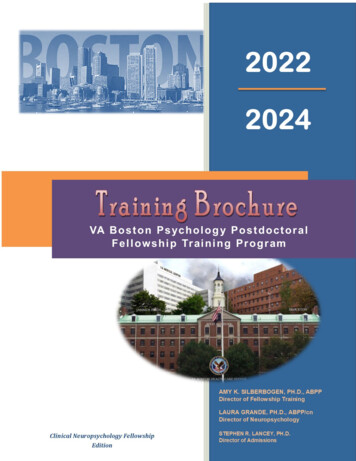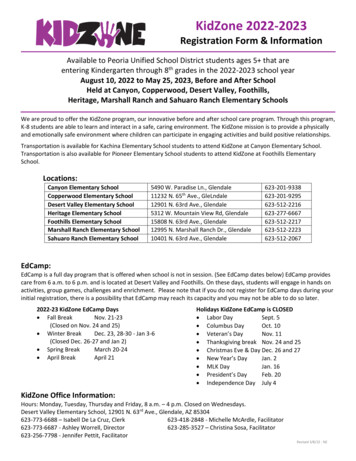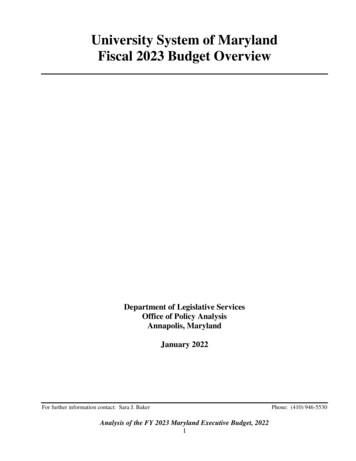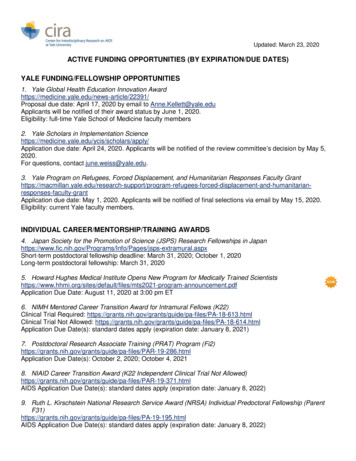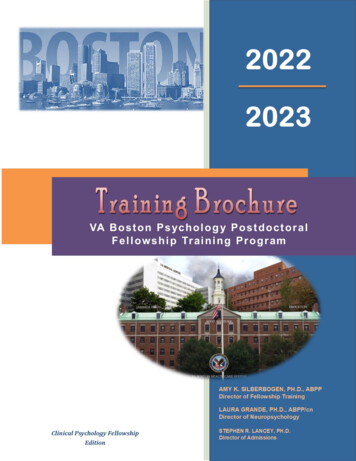
Transcription
Page 74
1
Jennifer J. Vasterling, Ph.D.Chief of Psychology – VA Boston Healthcare SystemChair, Executive Committee – VA Boston Healthcare System Psychology Training ProgramsAmy K. Silberbogen, Ph.D., ABPPDirector, Postdoctoral Fellowship Training ProgramPage1Laura Grande, Ph.D., ABPP-CNDirector, Clinical Neuropsychology Fellowship Training Program
Clinical Psychology Training ProgramAmy Silberbogen, Ph.D., ABPPDirector, Clinical Psychology Training ProgramJamaica Plain CampusTRACK COORDINATORS:Addiction Recovery TrackDaniel Rounsaville, Ph.D. – Brockton CampusMonica Roy, Ph.D. – Jamaica Plain CampusBehavioral MedicineDeAnna Mori, Ph.D.Jamaica Plain CampusGeropsychologyPatricia Bamonti, Ph.D., ABPPBrockton CampusInterprofessional General Mental HealthWilliam Bowe, Ph.D.Brockton and Jamaica Plain CampusesLGBTQ Health CareColleen Sloan, Ph.D.Brockton and Jamaica Plain CampusesPost-Deployment Readjustment and Trauma-Related DisordersJill Scott, Ph.D.Jamaica Plain CampusPage2Posttraumatic Stress DisorderScott Litwack, Ph.D. – PTSD Clinical TeamEve Davison, Ph.D. – Women’s Trauma and Recovery TeamJamaica Plain Campus
FELLOWSHIP ADMINISTRATIVE GROUPDirector of AdmissionsStephen R. Lancey, Ph.D.Jamaica Plain CampusCurriculum CoordinatorDavid Topor, Ph.D.Brockton CampusResearch CoordinatorKaren Mitchell, Ph.D.Jamaica Plain CampusPsychology Committee for Diversity and InclusionColleen Sloan, Ph.D.Scott Litwack, Ph.D.Jamaica Plain CampusAdministrative Officer for PsychologyTBDJamaica Plain CampusProgram Support AssistantsMs. Tai Antoine, J.D., MPHMs. Neysa Wright, M.Ed.Jamaica Plain CampusCONTACT US AT:Page3Psychology Service (116B)VA Boston Healthcare System150 South Huntington AvenueBoston, MA 02130Director: 857-364-4707Email: amy.silberbogen@va.govWeb: wship.asp
TABLE OF CONTENTSGreetings . 1Welcome . 6Impact of COVID-19 on Training . 7Philosophy and Model of Training . 8Orientation to the Fellowship / Teaching Methods. 9The Training ProgramsThe Clinical Psychology Training Program . 11Core Competencies . 12TracksAddiction Recovery Track . 15Addiction Recovery; Brockton Campus . 17Addiction Recovery; Jamaica Plain Campus. 21Behavioral Medicine Track . 28Geropsychology Track . 43Interprofessional General Mental Health Track . 53LGBT Health Care Track . 59Trauma Recovery TracksPost-Deployment Readjustment and Trauma-Related Disorders . 63Posttraumatic Stress Disorder Track. 69Review and Remediation Procedures . 77Training Environment . 78Diversity and Inclusion . 79VA Boston Psychology Service Committee on Diversity and Inclusion. 79Mental Health Multicultural Consultation Team . 80ALANAS Mentoring Program . 80Support Services . 81Research Activities . 81Living Environment / Cost of Living . 81Hours, Stipend, and Benefits . 82Page4continued next page
APA Accreditation . 83Eligibility . 83Application Process . 84Application Materials . 85Virtual Interview Days . 86Process . 86Statement of Nondiscrimination . 87If an Offer Is Extended . 87Current Fellows . 89Page5Recent Fellows’ First Post- Fellowship Position . 90
Welcometo the VA Boston Psychology Postdoctoral Fellowship Training Program!The structure of the VA Boston Psychology Postdoctoral Fellowship Program follows a multiple practiceformat as defined by APA. The Fellowship Program is organized into two separate areas:1. the substantive traditional practice area of Clinical Psychology, and2. the specialty practice area of Clinical Neuropsychology.This brochure describes the training opportunities available in the Clinical Psychology Program. Withinthe Clinical Psychology Training Program, we offer training in seven major areas of study (“tracks”) andwill recruit 12 full-time Fellows: Addiction Recovery (previously Dual Diagnosis and Addictions and Co-Occurring Disorders)Behavioral MedicineGeropsychologyInterprofessional General Mental HealthLGBTQ Health CarePost-Deployment Readjustment and Trauma Related DisordersPosttraumatic Stress Disorders (PTSD)Within the Clinical Neuropsychology Training Program, we offer training in Neuropsychology with theopportunity to specialize based on training needs and professional goals. We will recruit two full-timeFellows in the Clinical Neuropsychology Program. For additional information, please download theNeuropsychology Training Brochure located on the Fellowship homepage.Both the Clinical Psychology and Clinical Neuropsychology Training Programs exist within the overarchingstructure of the Fellowship Program and are independently accredited by American PsychologicalAssociation’s Commission on Accreditation Our next Site Visit for both programs will be in Spring 2024.Please note that we are in the process of seeking accreditation in the specialty practice area of ClinicalHealth Psychology. Fellows admitted to the Behavioral Medicine Track of the accredited ClinicalPsychology Program will be required to meet competencies of both the accredited Clinical PsychologyProgram and competencies consistent with APA accreditation in Clinical Health Psychology.Page6We are glad you are considering VA Boston for your postdoctoral training experience! Postdoctoraltraining has shifted considerably over the years; the purpose of postdoctoral training, as currentlyconceptualized, is to gain advanced competency development in either a specific focus area or major areaof study (i.e., VA Boston’s “Tracks” within our accredited Clinical Psychology program) or in a recognizedspecialty area of practice (i.e., VA Boston’s accredited Clinical Neuropsychology program). Whileenrollment in an accredited postdoctoral training program is not a requirement, we strongly believe thatformal training does offer many benefits. These include building confidence and professional identity,developing advanced competence across all domains of practice within a focus or specialty area ofpractice, and facilitating short- and long-term career goals, including licensure and board certification.APPIC’s journal, Training and Education in Professional Psychology, recently published a special edition onpostdoctoral training. We include a link here to an article (by Dr. Silberbogen and colleagues) that reviewsthe purpose of postdoctoral training in the sequence of training, and outlines considerations when makingdecisions about postdoctoral 325207464 Postdoctoral training in health service psychology Current perspectives in an evolving profession.
IMPACT OF COVID-19 ON TRAININGThe COVID-19 pandemic has had an unprecedented impact on all aspects of personal and professionallife, requiring flexibility, adaptability, and ingenuity. The VA Boston Psychology Postdoctoral TrainingProgram has been successful throughout the pandemic in remaining steadfast in our commitment toproviding high-quality clinical care for Veterans and high-quality training to our psychology trainees.Our psychology staff and trainees pivoted quickly in March 2020 to telecare and telesupervision, andsupported our trainees in navigating all aspects of providing telecare, including learning new platforms,providing psychotherapy and assessments remotely, setting up home environments to facilitate privacyand functionality, addressing personal challenges (e.g., shared workspaces with partners, child care,long-distance from loved ones) and facilitating community and connection. Dr. Silberbogen routinelymeets with the class of postdoctoral Fellows to ensure transparency, to address questions, and toproblem solve barriers. Despite the number of uncertainties that COVID-19 has brought, our value ofproviding outstanding training and our skill in implementing this value has been constant.The clinical experiences listed within this brochure are current, and all training experiences areanticipated to be available during the 2022-2023 training year. At the time of this writing (9/2021),most of our postdoctoral Fellows are on-site 3-5 days per week, in line with their clinical settings, andteleworking the remaining days. Our Fellows are instructed to follow safety procedures consistent withCDC and local facility guidelines, including mandatory screening upon presenting at the hospital,mandatory masking and PPE requirements, social distancing, cleaning protocols, and hand washing.Clinical supervision remains consistent with APA accreditation guidelines (minimum of 2.0 hours perweek). Supervisors meet with their trainees either in person or virtually by a number of video-basedplatforms (WebEx, Microsoft Teams). Currently, didactics and team meetings are offered remotely.Given some of the challenges of working remotely, we work to ensure our current class of Fellows isfeeling connected with the broader psychology community; community building will remain a highpriority.We anticipate that the 2022-2023 Fellows will continue to engage in some hybrid mix of remote and inperson work, consistent with the demands and requirements of their specific clinical placements. Welook forward to describing our modifications during our virtual interviews and to address anyconcerns/and or questions regarding our COVID-19 modifications. VA Boston is confident in its ability toprovide high quality training and mentorship to promote the professional development of our Fellows,despite the challenges brought on by COVID-19.Page7Please note that references to “direct”, “face-to-face” or “in-person” clinical care or supervision arealso inclusive of remote and virtual care during the COVID-19 pandemic. In addition, we have retainedreferences to campus-based locations in this brochure so that applicants are informed of where theywould be located, for in-person services.
PHILOSOPHY AND MODEL OF TRAININGThe VA Boston Psychology Postdoctoral Fellowship model for training entails four broad, corecomponents. Training is:1. Individualized, gr aduated, and primary : Training is individualized, such that we aim tobuild professional identity and responsibility through involvement in the training process. In otherwords, we ask that Fellows collaborate with their faculty mentors and supervisors to develop atraining plan that meets their specific training and career goals based on a needs assessment anddiscussions with faculty. Training is structured around those specific goals and increases incomplexity and responsibility over the course of the training year. Service delivery is the meansby which training and enrichment occur; however, service delivery is secondary to the broadermission of training.2. Based on a scientist-practitioner model: We employ and model a scientist-practitionerapproach to professional psychology, wherein empirically supported knowledge informspsychological assessment and intervention, and wherein questions arising from clinical practicedrives research endeavors. Training involves empirically supported treatments and assessmentmethods and ensures that Fellows utilize critical thinking skills to develop their own clinicalresearch questions and/or program development/evaluation projects. This goal is greatlyfacilitated by the rich and diverse clinical research setting offered by the training sites. VA Bostonis home to numerous National Research Centers and Centers of Excellence, with over thirtyfederally funded grants in the field of Mental Health and Substance Abuse. This wealth ofresearch resources creates an atmosphere that embodies the scientist-practitioner model.3. Sensitive to i ndividual differences: We work to identify, respect, and nurture the uniquepersonal attributes that the Fellow brings. The training environment is supportive and guidedthrough close collaboration with supervising faculty. Our training program is sensitive toindividual differences and diversity and values the enriched educational environment that occurswithin a diverse group of trainees and staff. Training involves self-awareness related to culturalfactors, as well as appreciating those social and cultural factors that influence patient centeredcare. For the ways in which VA Boston attends to and addresses individual “lived” differences inour trainees and patients, please see our “Diversity and Inclusion” section. This section describesadditional program and service wide resources.Page84. Collaborative: We utilize a “junior colleague” model of training. Our commitment to theFellows’ professional growth and scholastic development is conveyed in a supportive trainingatmosphere emphasizing individual strengths. Our major resource in this endeavor is thesignificant investment of enthusiasm, energy, and time of our training staff, includingpsychologists and non-psychology supervisors. Fellows are challenged to think critically, andconstructive criticism is offered in a non-threatening manner to encourage the Fellow’s fullparticipation in all endeavors, scientific and clinical. We provide training in multidisciplinary andinterdisciplinary care environments in which the Fellow develops confidence as a local mentalhealth expert who collaborates effectively with a range of providers in the context of a largemedical system. Fellows will learn to work effectively with a variety of other disciplines, as wellas collaborate with other mental health practitioners in clinical and research domains.
ORIENTATION TO THE FELLOWSHIPAll Fellows in the Clinical Psychology Training Program are supported from Sunday, August 14, 2022through Saturday, August 14, 2023. The Orientation to the Fellowship begins on Monday, August 15,2022. The organization of the Fellowship Program provides Fellows access to different populations andan opportunity to assume a variety of roles. The Fellowship includes clinical, research, and educationalcomponents, described below.TEACHING METHODSSupervised Service Delivery in direct contact with service recipients. Fellows in the Clinical Psychologyprogram will spend a minimum of 25% (10 hours) of their week engaged in direct, face-to-face clinicalcare. As appropriate for training, face-to-face patient encounters are but one component of servicedelivery, and delivery of patient care is secondary to the educational mission of the training. In addition,there are numerous activities that the Fellow will engage in that are in support of face-to-face clinicalcare. The combination of face-to-face clinical care and all supportive clinical functions (e.g., consultationwith other providers, report writing, medical record review, supervision, and provision of supervision) willcomprise approximately 75% of a Fellows’ training.Supervision: Fellows receive at least two hours of individual, face-to-face, scheduled supervision with alicensed psychologist who has expertise in the activities being supervised. Fellows may also receive groupsupervision, with a maximum of three trainees. Fellows receive supervision from a minimum of twolicensed psychologists during the training year, one of whom is identified as the “primary” mentor. Aminimum of 2.5 hours of supervision per week (individual supervision comprising at least two hours) isrequired throughout the training year.Other Structured Learning Activities: Fellows participate in a minimum of 1.5 additional hours of otherstructured learning activities, including program-wide and track specific didactics, team meetings, rounds,and case conferences. On average, Fellows participate in approximately 2 – 4 hours of other structuredlearning activities.Page9Scholarly Mentorship: While the primary focus of the Fellowship training program is the development ofclinical skills, Fellows engage in an array of clinical research and other scholarly inquiry opportunities. AllFellows will select a research mentor who will supervise these activities, and the broad scholarly inquiryexperience is overseen by the Research Experiences Coordinator, Karen Mitchell, Ph.D. Fellows areexpected to have a minimum of four (4) hours of protected time within their regular schedules to bedevoted to research and scholarly activities. These four hours are seen as a base; Fellows on some Tracksmay be able to avail themselves of research opportunities beyond these dedicated hours (up to 10 hoursper week) through discussion with their supervisors and research mentor. Please see Track specificdescriptions for additional information. Fellows may collaborate with faculty on ongoing research or aprogram evaluation project, participate in research lab meetings and other team collaborations, or designand implement an independent research project under the mentorship of a faculty member. Activitiesmay include reading and literature searches, consulting on and participating in some of the daily tasks ofdata collection and coding, data entry, and data analysis, as well as developing posters or presentations,and manuscript presentation. Fellows are encouraged to present their work in local, regional, and/ornational educational settings, or submit work for publication as appropriate. Additionally, Fellows presenttheir research progress during Fellowship wide didactics towards the end of their training year.
Didactic Seminars:All Fellows attend a biweekly seminar chaired by David Topor, Ph.D., Curriculum Coordinator. Duringdidactics, we develop a sense of professional community and peer support during the Fellowship trainingyear. Topics are scheduled based on a Needs Assessment completed by Fellows at the start of theirtraining. Speakers are invited to present didactics on professional development issues, leadership, ethics,supervision, diversity and ethnicity, and professional identity. Several didactics that are directed atteaching specific evidenced based psychotherapy are shared with clinical psychology interns.In addition to program wide didactics, many elective seminars are announced throughout the trainingyear. Risa Weisberg, Ph.D., and Erika Wolf, Ph.D., coordinate a weekly Grant Writing Seminar throughoutthe training year. Additionally, Fellows are invited to attend the one-hour bimonthly Research Fellows’seminar series developed by Daniel Lee, Ph.D. (e.g., Grant Mechanisms, Understanding VA Funding,Transitioning out of the Role of a Fellow).Finally, Fellows are expected to attend the Psychology Service’s annual Psychology Education Day (atraining day for staff and trainees geared toward particular themes). Recent themes for past TrainingDays included interprofessional training, positive psychology, DSM-V, ethics, mentorship and supervisionissues, multicultural issues in clinical treatment, patient advocacy, and returning veterans.Additionally, each clinical program has developed training experiences that are intended to focus ongaining knowledge and skills in emerging areas of specialization. These training experiences includedidactic seminars, colloquia, symposia, co-therapy, role modeling, observation, case conferences, rounds,group supervision, and journal clubs. Also, Fellows across the different specialty areas are given theopportunity to attend various seminars conducted in other programs, grand rounds, departmentalsymposia, etc.Non-Evaluative Mentor:Page10Each Fellow selects a Non-Evaluative Mentor (NEM) from among faculty members, who will serve as ayear-long mentor for the trainee. The NEM may represent an area of particular clinical or researchinterest for the trainee, or may be a psychologist whose background or other qualities (e.g., ability tospeak to balancing career and family life, including being a parent or caring for ill/elderly family members)is of relevance. The NEM may be linked to the trainee’s training experiences but cannot be a directsupervisor or evaluator of the trainee. The NEM provides counsel and is meant to assist the trainee in theoverall coordination of their training experiences throughout the year. Examples of areas that might bediscussed during meetings could include issues related to professional development, identitydevelopment, career trajectory/choices, work/life balance, and postdoctoral applications/decisionmaking, among others.
THE FELLOWSHIP TRAINING PROGRAMS OF VA BOSTONCLINICAL PSYCHOLOGY TRAINING PROGRAMThe Clinical Psychology Training Program is independently accredited by APA but functions within thestructure and administration of the VA Boston Psychology Postdoctoral Fellowship Program. AmySilberbogen, Ph.D., ABPP is the Director of the Clinical Psychology Postdoctoral Fellowship Program.Within this program, opportunities are available for training in nine focus areas. These include: AddictionRecovery, Behavioral Medicine, Geropsychology, Interprofessional General Mental Health, LGBT HealthCare, Posttraumatic Stress Disorder, and Post-Deployment Readjustment.Program AimThe overarching AIM of our program is to provide advanced clinical training and educational opportunitiesin order that Fellows develop the full range of skills required for independent functioning as a clinicalpsychologist in a broad range of roles and settings, including clinical services, research, and education.Our program is grounded in the scientist-practitioner model and endorses the view that good clinicalpractice is based on the science of psychology. In turn, the science of psychology is influenced by handson clinical work. Consequently, our approach to training encourages clinical practice that is evidencebased and consistent with the current state of scientific knowledge and involvement in research thatadvances patient care. We believe that graduating Fellows should be able to provide competentassessment and appropriate interventions, consultation, and supervision in their area(s) of focus, as wellas exhibit behavior that is consistent with professional standards. As a part of developing a healthyprofessional identity, Fellows are provided access to appropriate mentorship relationships in their area(s)of interest, and they also participate in directing their own professional development. Graduating Fellowsalso possess the requisite skills to bring research and clinical literatures to bear on their applied work, andto communicate their own scholarly endeavors and interests to other mental health practitioners. Whileindividual Fellows may ultimately develop careers that emphasize one aspect of the scientist-practitionermodel more than the other, our expectation is that clinicians will practice from a scientific basis and thatthe work of scientists will be clinically relevant.Page11The structure of the VA Boston Psychology Fellowship Program fosters development across nineprofession-wide competencies that are critical to an independently functioning psychologist. We expectthat Fellows in the Clinical Program will gain both breadth in competency, as well as depth within their
particular area of focus. Below are the Level 1 and Level 2 competencies to be developed through astructured, coherent, and integrated training experience that is graded, sequential and cumulative.Core Competencies:Level 1 – Advanced Competencies Required of all Programs at the Postdoctoral Level1.Science and Practice: Fellows will demonstrate the ability to critically evaluate and disseminateresearch or other scholarly activities at the local (including host institution), regional, or nationallevel. Fellows will demonstrate the ability to think critically about existing literature and applyscientific knowledge to clinical practice, as well as allow clinical practice to inform researchquestions. Fellows will develop skills in critical thinking, curiosity, and hypothesis testing and willplay an active role in developing their own research and/or program development and evaluationgoals. Fellows will also receive supervision through relationships with research mentors on legaland ethical safeguards required by VA, APA, and IRB.2.Ethical and Legal Standards: Fellows will demonstrate the ability to respond professionally inincreasingly complex situations with a greater degree of independence in accordance with theAPA Ethical Principles of Psychologists and Code of Conduct and relevant laws, regulations, rules,policies, standards, and guidelines. Ethical and legal issues will arise in all areas of training,including confidentiality, legal obligation to warn of danger or report abuse, competencyassessments, the right to refuse treatment, assessments of dangerousness, informed consent,and publication credit. Fellows receive supervision and didactic training related to these issuesand learn to recognize ethical dilemmas as they arise, apply ethical decision-making processes inorder to resolve the dilemmas, and to conduct themselves in an ethical manner in all professionalactivities.3.Individual and Cultural Diversity: Fellows will demonstrate the ability to conduct all professionalactivities with sensitivity to human diversity, including the ability to deliver high quality servicesto an increasingly diverse population. Fellows demonstrate knowledge, awareness, sensitivity,and skills when working with diverse individuals and communities who embody a variety ofcultural and personal background and characteristics. Fellows will demonstrate sensitivity topatient cultural diversity, including race, ethnicity, religion, country of birth, gender, social class,age, sexual orientation, disability and health status, as well as other individual differences,integrating awareness and sensitivity into all professional roles. Additionally, Fellows willdemonstrate a continued willingness to explore one’s own cultural background and how thisinfluences one’s personal attitudes, beliefs, and biases. Issues related to diversity are discussedduring supervision, as well as incorporated into all program wide didactics.Level 2 – Program Specific Competencies12Professional Values and Attitudes: Fellows are exposed to professional role models whoembrace the values and attitudes of psychology, including integrity, deportment, professionalidentity, accountability, lifelong learning, and concern for the welfare of others. Fellows areexpected to demonstrate these values as they also engage in self-reflection regarding one’spersonal and professional functioning, and engage in activities to maintain and improveperformance, wel
VA Boston's "Tracks" within our accredited Clinical Psychology program) or in a recognized specialty area of practice (i.e., VA Boston's accredited Clinical Neuropsychology program). While enrollment in an accredited postdoctoral training program is not a requirement, we strongly believe that formal training does offer many benefits.


